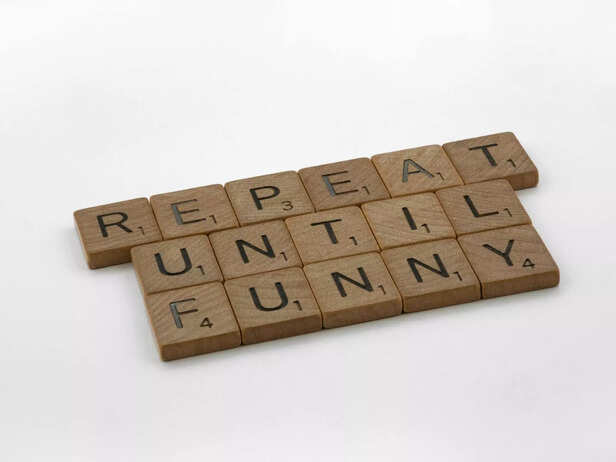You Think You’re Broken. The Gita Says You’re Just Too Attached to Your Pain
Riya Kumari | Jun 02, 2025, 18:02 IST
( Image credit : Freepik, Timeslife )
There’s something strangely comforting about pain when you’ve lived with it long enough. Like an old song you don’t even like but still know by heart. The heartbreak, the failure, the rejection—it sits with you like a familiar shadow. You don’t even notice how tightly you’re holding it anymore. It becomes your story. Your identity. Your edge. You think you’re broken. But what if you’re not? What if the only thing broken is your belief that you are?
There are days you don’t recognize yourself. You look fine—your face does the thing it’s supposed to do in selfies, you laugh at the right parts of conversations, you get through work, you reply to messages. But somewhere in the quiet moments—between checking your phone and turning out the lights—you feel it. That weight. That ache. That quiet voice that whispers, “Something’s wrong with me.” You wouldn’t say it out loud. But it’s there. Like a low hum in the background.
You Are Not What Happened To You

I’m not over it. I’m too much. I mess everything up. I’m never enough. I’m still broken. But what if you’re not? What if the reason you feel broken is because you’ve spent too long trying to build your life around your pain—like it’s the foundation when it was only meant to be a passing storm?
The Bhagavad Gita doesn’t look away from suffering. It walks straight into it. But it also says something few of us ever hear: You are not what happened to you. You are the one who’s still here, watching. Surviving. Choosing.
You are not the pain. You’re the one carrying it. And the two are not the same.
Pain Needs to Be Felt. But Not Worshipped.

We don’t hold onto pain because we like being miserable. We hold onto it because, for a while, it gave us a way to make sense of the chaos. When someone left. When something fell apart. When the version of life you imagined collapsed overnight. Pain made you feel grounded in something. Even if that something was sadness. And slowly, the sadness stopped being a feeling—and started becoming an identity.
You learned how to talk about your trauma before you learned how to believe it’s not the most interesting thing about you. You turned your survival into your personality. But survival isn’t living. And the Gita knows that. It doesn’t ask you to forget what happened. It asks you not to become it.
Letting Go Isn’t Weak. It’s Sacred

When Krishna tells Arjuna to detach, he’s not telling him to shut down or go numb. He’s asking him to remember who he is beneath the fear. Beneath the heartbreak. Beneath the noise. And maybe that’s what we all need sometimes. Not another coping mechanism. Not another productivity hack. Not another 5-step plan to become our “best selves.”
Maybe we need to sit still long enough to ask: What pain am I carrying that isn’t helping me anymore—but I don’t know who I’d be without it? That’s the thing about healing we don’t talk about. It’s not always about effort. Sometimes it’s about surrender. Not the kind of surrender that means giving up. The kind that means softening. Softening the grip you have on the story that says: This is just who I am now.
You Are Allowed to Begin Again

It’s hard to explain what it feels like to carry invisible wounds. The ones people can’t see, but that affect everything. The way you trust. The way you love. The way you expect the worst, just so you’re not surprised when it shows up. But just because something has been true for a long time doesn’t mean it always has to be. The Gita says your soul—the real you—was never touched by any of this. That you can step out of the narrative whenever you’re ready.
That you can begin again. Not when you’ve figured it all out. Not when you’ve healed perfectly. Now. As you are. You are not behind. You are not broken. You are not late to your own life. You’re just learning how to release the things you thought you needed to hold onto forever.
The Most Radical Thing You Can Do Is Let Go

Let go of needing to be understood by people who never really saw you. Let go of defining yourself by the worst things that happened to you. Let go of the belief that healing has to be loud and visible and shiny. Let go of the idea that you’re too damaged to be loved deeply. Let go of the old pain—not because it didn’t matter, but because you matter more. The Gita doesn’t say “don’t feel.” It says: Feel it all, and then remember—you are not the wave.
You are the ocean beneath it. You are still whole. Even with the scar. Especially with the scar. So maybe today isn’t the day you get over everything. But maybe it’s the day you stop calling yourself broken. And maybe, just maybe, that’s where the healing begins.
You Are Not What Happened To You

Pain
( Image credit : Pexels )
I’m not over it. I’m too much. I mess everything up. I’m never enough. I’m still broken. But what if you’re not? What if the reason you feel broken is because you’ve spent too long trying to build your life around your pain—like it’s the foundation when it was only meant to be a passing storm?
The Bhagavad Gita doesn’t look away from suffering. It walks straight into it. But it also says something few of us ever hear: You are not what happened to you. You are the one who’s still here, watching. Surviving. Choosing.
You are not the pain. You’re the one carrying it. And the two are not the same.
Pain Needs to Be Felt. But Not Worshipped.

Teach
( Image credit : Pexels )
We don’t hold onto pain because we like being miserable. We hold onto it because, for a while, it gave us a way to make sense of the chaos. When someone left. When something fell apart. When the version of life you imagined collapsed overnight. Pain made you feel grounded in something. Even if that something was sadness. And slowly, the sadness stopped being a feeling—and started becoming an identity.
You learned how to talk about your trauma before you learned how to believe it’s not the most interesting thing about you. You turned your survival into your personality. But survival isn’t living. And the Gita knows that. It doesn’t ask you to forget what happened. It asks you not to become it.
Letting Go Isn’t Weak. It’s Sacred

Surrender
( Image credit : Pexels )
When Krishna tells Arjuna to detach, he’s not telling him to shut down or go numb. He’s asking him to remember who he is beneath the fear. Beneath the heartbreak. Beneath the noise. And maybe that’s what we all need sometimes. Not another coping mechanism. Not another productivity hack. Not another 5-step plan to become our “best selves.”
Maybe we need to sit still long enough to ask: What pain am I carrying that isn’t helping me anymore—but I don’t know who I’d be without it? That’s the thing about healing we don’t talk about. It’s not always about effort. Sometimes it’s about surrender. Not the kind of surrender that means giving up. The kind that means softening. Softening the grip you have on the story that says: This is just who I am now.
You Are Allowed to Begin Again

Healing
( Image credit : Pexels )
It’s hard to explain what it feels like to carry invisible wounds. The ones people can’t see, but that affect everything. The way you trust. The way you love. The way you expect the worst, just so you’re not surprised when it shows up. But just because something has been true for a long time doesn’t mean it always has to be. The Gita says your soul—the real you—was never touched by any of this. That you can step out of the narrative whenever you’re ready.
That you can begin again. Not when you’ve figured it all out. Not when you’ve healed perfectly. Now. As you are. You are not behind. You are not broken. You are not late to your own life. You’re just learning how to release the things you thought you needed to hold onto forever.
The Most Radical Thing You Can Do Is Let Go

Cry
( Image credit : Pexels )
Let go of needing to be understood by people who never really saw you. Let go of defining yourself by the worst things that happened to you. Let go of the belief that healing has to be loud and visible and shiny. Let go of the idea that you’re too damaged to be loved deeply. Let go of the old pain—not because it didn’t matter, but because you matter more. The Gita doesn’t say “don’t feel.” It says: Feel it all, and then remember—you are not the wave.
You are the ocean beneath it. You are still whole. Even with the scar. Especially with the scar. So maybe today isn’t the day you get over everything. But maybe it’s the day you stop calling yourself broken. And maybe, just maybe, that’s where the healing begins.
